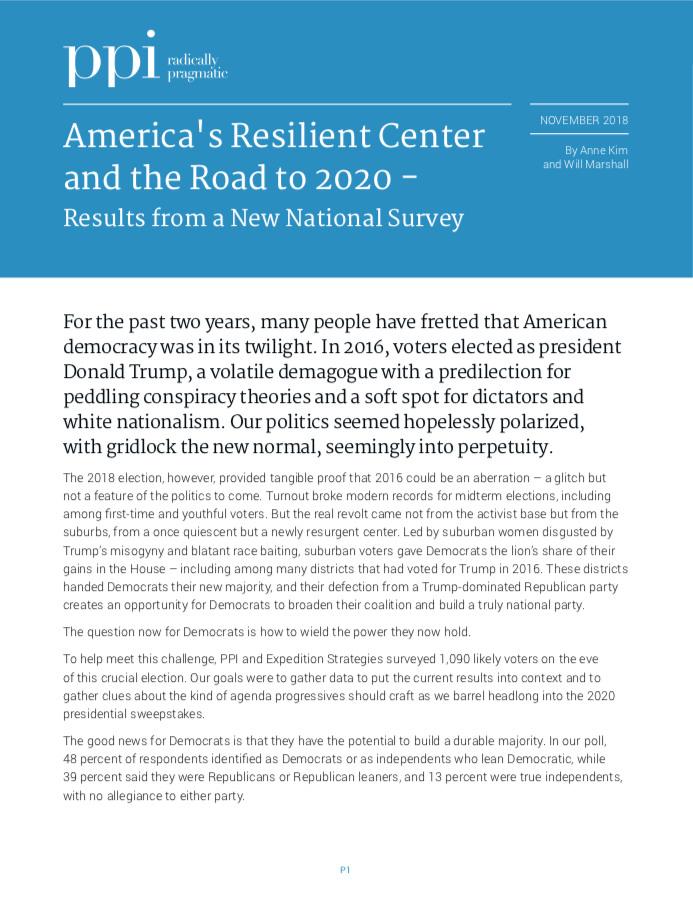National survey shows suburban voters repelled by President Trump’s divisive behavior, open to Democrats’ “Big Tent” approach
WASHINGTON —The Progressive Policy Institute (PPI) today released a national opinion survey that highlights the surprising resilience of America’s pragmatic political center two years into Donald Trump’s deeply polarizing presidency. The poll reinforces a key takeaway from the 2018 midterm elections: Suburban voters – especially women – are repelled by the president’s racial and cultural demagoguery and are moving away from a Trump-dominated GOP.
“Our poll suggests that Donald Trump’s election in 2016 is more likely to be an aberration than any permanent shift in America’s political course,” said Anne Kim, PPI Director of Social and Domestic Policy and PPI President Will Marshall. “The defection of suburban voters creates a political landscape that favors Democrats in 2020 – if they stick to the ‘big tent’ approach that proved so effective in the midterm.”
The poll conducted by Pete Brodnitz at Expedition Strategies contains findings about what’s top of mind for voters, their ideological outlook and leanings, and their views on health care, trade, growth and inequality, the role of government, monopoly and competition, and other contentious issues.
“The agenda that could help Democrats sustain a governing majority, our poll suggests, is one that is progressive yet pragmatic—one that’s optimistic, aspirational and respects Americans’ beliefs in individual initiative and self-determination; one that broadens Americans’ opportunities for success in the private sector and strengthens the nation’s global economic role; one that demands more from business but doesn’t cross the line into stifling growth; and one that adopts a practical approach to big challenges such as immigration reform and climate change,” write Kim and Marshall.
“For Democrats to maintain and expand this near-majority advantage, they must craft a broadly appealing agenda that brings or keeps independents and less committed partisans—the majority of whom call themselves ‘moderate’—under the tent.”
The following key findings from PPI’s survey provide some guideposts for how progressives can develop a winning agenda and message in 2020:
Moderates matter more than ever.
Strong partisans of either stripe were a minority among our respondents – potential evidence that the nation may have hit “peak polarization” and is now on its way to a more rational equilibrium.
Americans want help, not handouts.
Despite the strong economy, many Americans are anxious about their economic futures. Nevertheless, the vast majority of Americans do not see government’s job as rescuing them from these anxieties.
Voters are open to a bigger federal role in health care and are especially worried about drug prices – but the messages are mixed.
Nearly half of respondents ranked health care as one of their top three concerns. High costs – especially prescription drug prices – and the fear of losing coverage were voters’ biggest worries.
Companies need to step it up on wages, but treating Big Business as the enemy is a mistake.
Despite the unpopularity of some sectors, voters are not generally anti-business. Few voters, for instance, are worried about corporate monopolies.
Businesses are no longer getting a free pass when it comes to wages and worker treatment. Our survey found surprisingly strong support for government intervention to raise wages.
Nationalism is a failing strategy – perhaps even among Trump’s core supporters.
Voters would like to see American companies succeed globally and don’t support closing our economy to foreign trade or Trump’s tariff wars. More broadly, voters would like to see the United States involved with the world rather than retreating inward.
The federal deficit could be the sleeper issue of 2020.
Voters are very worried about government spending and debt. It ranked as their second biggest worry, behind drug prices, and fifth on the list of big problems they want Washington to tackle.
Don’t forget immigration.
While immigration priority ranked relatively low for Democrats, it registered as the top-tier concern for Republicans and a major concern for independents. Immigration also looms large for non-college-educated whites, both men and women. The good news is that voters are far more nuanced in their views on immigration than President Trump.
Voters are pragmatists on energy and climate change.
Green hostility to fossil fuel is an anti-jobs stance among moderate voters. Democrats can win on energy and climate issues – but only if they stop outsourcing their energy policy to green activists and avoid a false choice between fossil fuels and renewable energy.
Americans prefer a responsive local government over a centralized federal government that they deeply distrust.
Voters across the political spectrum deeply distrust the federal government, both in its capacity and competence to get things done and on the question of whether it serves the interests of the public versus those of moneyed concerns.
While voters see state governments as much less captive to special interests than Washington, they otherwise tended to give the states similar grades. However, they express a strikingly high level of satisfaction in local government.
###